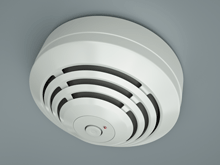 Carbon monoxide is a poisonous gas produced by the incomplete combustion of fuels. You can’t see, smell or taste carbon monoxide. So, if you use appliances that burn natural gas, propane, oil or wood in your home, it’s imperative to have carbon monoxide detectors installed in the right areas, and test them regularly.
Carbon monoxide is a poisonous gas produced by the incomplete combustion of fuels. You can’t see, smell or taste carbon monoxide. So, if you use appliances that burn natural gas, propane, oil or wood in your home, it’s imperative to have carbon monoxide detectors installed in the right areas, and test them regularly.
Carbon Monoxide Poisoning
Carbon monoxide (CO) poisoning is responsible for more than 200 American deaths per year, and sends thousands more to emergency rooms. CO attaches to hemoglobin in the blood, which prevents the brain, heart and other vital organs from receiving oxygen. Symptoms of low levels of CO exposure include headache, nausea, dizziness and vomiting. Higher levels of CO poisoning can cause chest pain, vision impairment, disorientation, convulsions and death.
Testing CO Detectors
When fuel combustion is efficient, the combustion process gives off carbon dioxide. When combustion is incomplete due to dirty or malfunctioning combustion parts, CO is given off. Since CO can’t be detected by human senses, CO detectors are the only practical detection method. Check all CO detectors in your home each month. Here’s how:
- Locate the test button on the CO detector.
- Press and hold the button until the CO detector starts beeping.
- Release the button.
If your CO detectors operate using batteries, replace the batteries with fresh ones each year on a specific date you’ll remember, such as the first day of winter.
Best Locations for CO Detectors
CO can leak and stay within a relatively confined space in your home. CO can also be sucked into air ducts and spread through the home. So, it’s very important to install a CO detector on each floor of your home, including the basement, attic and attached garages and workshops.
Install a CO detector within eight feet of each bedroom. During the heating months, the gas furnace is typically running, which statistically increases the risk of CO poisoning. So, you want the detectors close enough to wake everyone, should they go off.
To learn more about carbon monoxide detectors and safety in your Warren home, contact us at Aladdin Heating & Cooling.
Our goal is to help educate our customers in Warren, Michigan about energy and home comfort issues (specific to HVAC systems). For more information about carbon monoxide detectors and other HVAC topics, download our free Home Comfort Resource guide.
Credit/Copyright Attribution: “Grzegorz Petrykowski/Shutterstock”
